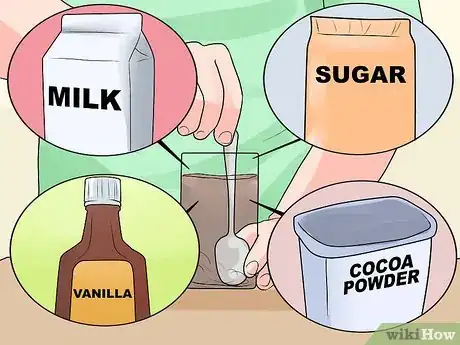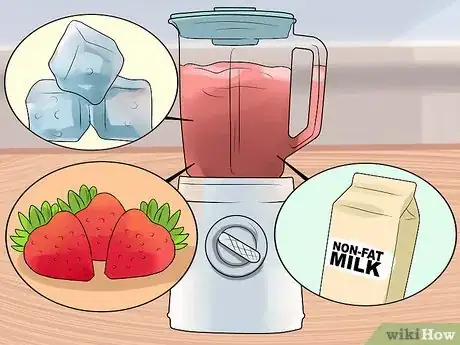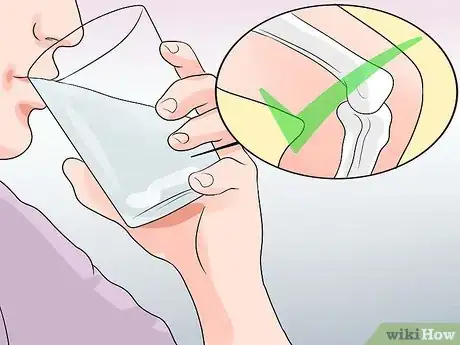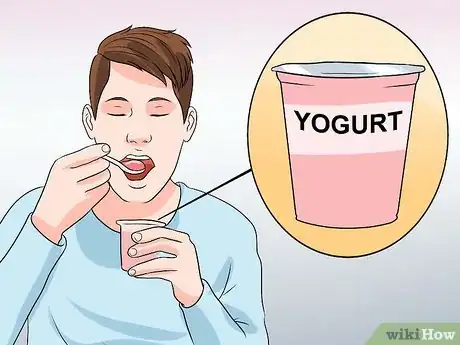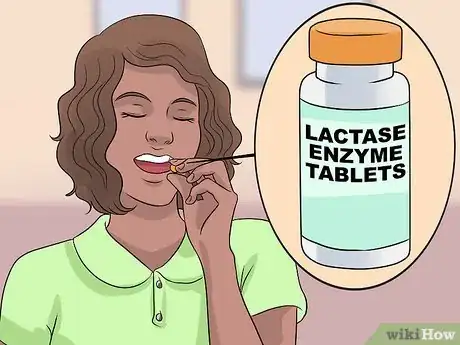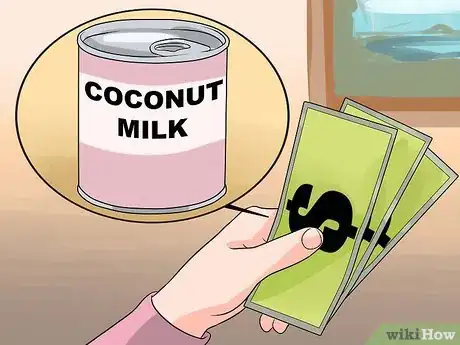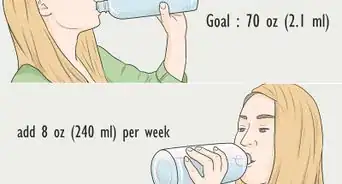This article was co-authored by Claudia Carberry, RD, MS. Claudia Carberry is a Registered Dietitian specializing in kidney transplants and counseling patients for weight loss at the University of Arkansas for Medical Sciences. She is a member of the Arkansas Academy of Nutrition and Dietetics. Claudia received her MS in Nutrition from the University of Tennessee Knoxville in 2010.
There are 24 references cited in this article, which can be found at the bottom of the page.
This article has been viewed 138,960 times.
Milk is very important for a healthy lifestyle. Drinking 2-3 cups of milk every day can help you give your body enough calcium, phosphorous, magnesium, protein, vitamin A, B12, C, and D, and may help lower blood pressure, and reduce the risks of cardiovascular disease and type-2 diabetes.[1] If you're concerned that you're not drinking enough milk, a few simple changes to your daily diet can make it easy to get the nutrients you need.
Steps
Drinking More Milk
-
1Drink milk every day. The USDA recommends that both children and adults should drink 3 cups of low-fat or fat-free milk (or equivalent dairy products) everyday in order to get the calcium and vitamins your body needs.
- Children are encouraged to drink whole milk until age 2 and then switch to 2% milk.
- If you don't like the taste of milk, try adding flavors like vanilla extract, banana extract, or strawberry syrup.
-
2Add milk to hot beverages. Try adding milk to your coffee, tea, or hot chocolate. Milk will make your beverages creamy and smooth while reducing acidity and bitterness.[2]
- Be aware, though, that adding milk to tea may reduce the benefits of drinking tea. Milk proteins interfere with your body's ability to absorb the beneficial flavonoid antioxidants found in tea.[3]
Advertisement -
3Use non-fat powdered milk. Powdered milk can be added to any recipe that calls for milk, and can be used in coffee as a nutritious, fat-free substitute for non-dairy creamer. You can even add non-fat powdered milk to a glass of milk to double your vitamin intake.[4]
-
4Make chocolate milk. For a sweet treat that will satisfy adults and children alike, try making your own chocolate milk at home.
- Mix cocoa powder, vanilla, milk, and sugar to taste. It's a simple, delicious recipe that will satisfy your craving for sweets without all the additives of store-bought chocolate milk.[5]
-
5Get creative. You can add milk to various recipes to make the food taste richer and creamier, while giving you an extra boost of vitamins and calcium.
-
6Try using milk to make smoothies. Adding milk will thicken your smoothie and help you bulk up on vitamins and nutrients.[6]
- Use a blender to mix ice, fruit, and non-fat or low-fat milk. If low-fat milk isn't thick enough for your smoothie, scoop in some creamy peanut butter for a richer, fuller flavor.
Changing Your Diet
-
1Change your milk. If you're used to drinking whole milk, gradually lower yourself down to skim milk. This will reduce your intake of calories and saturated fat. Step down slowly from whole milk to two percent milk, then down to one percent milk, and finally, skim milk.
- You may want to consider organic milk without added hormones.
-
2Count calories. While most varieties of milk do come with calories, you can make smart choices or substitutions to accommodate for those calories in your daily diet. Cut out "empty" calories from your diet and drink more milk instead.
- If you're unsure about whether you are getting enough dairy, or worry that you're consuming too much, talk to your doctor or a registered dietitian about dietary changes you can make for a better-balanced meal plan.
-
3Choose milk over soda. One twelve-ounce cup of skim milk has fewer calories than most twelve-ounce cans of soda, and delivers vitamins and nutrients that soda lacks.[7]
-
4Make milk a priority. Milk and dairy products are essential for delivering the vitamins and nutrients your body needs to stay healthy and strong. You may need to cut out other parts of your diet if you're worried about fat and caloric intake, but milk should be a priority because of its many health benefits.
- Calcium keeps bones and teeth healthy.[8]
- Protein is a good source of energy and builds and repairs your muscle tissue.
- Potassium helps regulate blood pressure and is important for bone and muscle strength.[9]
- Phosphorus helps strengthen your bones and teeth. It also helps your body filter waste in the kidneys.
- Vitamin D helps your body absorb calcium and phosphorous.[10]
- Vitamin B12 helps maintain healthy red blood cells and helps maintain nerve tissue.[11]
- Vitamin A helps maintain normal vision and healthy skin, teeth, and tissue.[12]
- Niacin, a B vitamin, can help regulate your cholesterol.[13]
-
5Get your dairy from other sources. If you're worried about adding calories by drinking milk with a meal, try fat-free yogurt as a healthy snack. You can even make a breakfast out of yogurt by adding dry cereal, nuts, and fruit.[14]
Drinking Milk When You're Lactose Intolerant
-
1Drink a glass of milk with food. Some people who have a hard time digesting lactose (found in dairy products) find that combining milk with food makes it easier to digest.[15]
-
2Take lactase enzyme tablets. These over-the-counter pills can be taken right before meals to help your body digest milk and dairy products.[16]
-
3Buy lactose-free milk. Some dairies and milk producers add lactase directly to milk, so you can get the taste and nutritional value of milk without the risk of digestive problems.[17]
- Unsweetened almond milk, coconut milk and rice milk are all great alternatives.
-
4Try other dairy products. If drinking milk is not an option, opt for other milk products, like yogurt or cheese. Even though these foods are still made with milk, they may be easier to digest.[18]
Expert Q&A
-
QuestionHow many glasses of milk should you drink a day?
 Claudia Carberry, RD, MSClaudia Carberry is a Registered Dietitian specializing in kidney transplants and counseling patients for weight loss at the University of Arkansas for Medical Sciences. She is a member of the Arkansas Academy of Nutrition and Dietetics. Claudia received her MS in Nutrition from the University of Tennessee Knoxville in 2010.
Claudia Carberry, RD, MSClaudia Carberry is a Registered Dietitian specializing in kidney transplants and counseling patients for weight loss at the University of Arkansas for Medical Sciences. She is a member of the Arkansas Academy of Nutrition and Dietetics. Claudia received her MS in Nutrition from the University of Tennessee Knoxville in 2010.
Master's Degree, Nutrition, University of Tennessee Knoxville Master's Degree, Nutrition, University of Tennessee KnoxvilleExpert AnswerThe recommendation is to drink 2-3 glasses per day. Or, you could eat dairy foods instead.
Master's Degree, Nutrition, University of Tennessee KnoxvilleExpert AnswerThe recommendation is to drink 2-3 glasses per day. Or, you could eat dairy foods instead. -
QuestionWhy you should drink milk every day?
 Claudia Carberry, RD, MSClaudia Carberry is a Registered Dietitian specializing in kidney transplants and counseling patients for weight loss at the University of Arkansas for Medical Sciences. She is a member of the Arkansas Academy of Nutrition and Dietetics. Claudia received her MS in Nutrition from the University of Tennessee Knoxville in 2010.
Claudia Carberry, RD, MSClaudia Carberry is a Registered Dietitian specializing in kidney transplants and counseling patients for weight loss at the University of Arkansas for Medical Sciences. She is a member of the Arkansas Academy of Nutrition and Dietetics. Claudia received her MS in Nutrition from the University of Tennessee Knoxville in 2010.
Master's Degree, Nutrition, University of Tennessee Knoxville Master's Degree, Nutrition, University of Tennessee KnoxvilleExpert AnswerLow-fat milk is a source of calcium, phosphorous, magnesium, protein, and vitamins A, B12, C, and D.
Master's Degree, Nutrition, University of Tennessee KnoxvilleExpert AnswerLow-fat milk is a source of calcium, phosphorous, magnesium, protein, and vitamins A, B12, C, and D. -
QuestionIs it bad to drink a gallon of milk in one day?
 Claudia Carberry, RD, MSClaudia Carberry is a Registered Dietitian specializing in kidney transplants and counseling patients for weight loss at the University of Arkansas for Medical Sciences. She is a member of the Arkansas Academy of Nutrition and Dietetics. Claudia received her MS in Nutrition from the University of Tennessee Knoxville in 2010.
Claudia Carberry, RD, MSClaudia Carberry is a Registered Dietitian specializing in kidney transplants and counseling patients for weight loss at the University of Arkansas for Medical Sciences. She is a member of the Arkansas Academy of Nutrition and Dietetics. Claudia received her MS in Nutrition from the University of Tennessee Knoxville in 2010.
Master's Degree, Nutrition, University of Tennessee Knoxville Master's Degree, Nutrition, University of Tennessee KnoxvilleExpert AnswerYes, that is too much milk in one day. A serving of milk is 8 ounces and you shouldn't have more than 3 servings per day.
Master's Degree, Nutrition, University of Tennessee KnoxvilleExpert AnswerYes, that is too much milk in one day. A serving of milk is 8 ounces and you shouldn't have more than 3 servings per day.
Warnings
- Do not substitute ice cream for milk, because of fat and sugar content.⧼thumbs_response⧽
- Do not drink milk if you are lactose intolerant, vegan or both.⧼thumbs_response⧽
- Never drink unpasteurized milk, especially if you are pregnant. Drinking unpasteurized milk may expose you to listeria, a type of bacteria that can be fatal. You should also avoid cheeses that are made out of unpasteurized milk.[24]⧼thumbs_response⧽
- Be aware that if you start drinking more milk, it will add to the amount of fluid you currently drink. If you already drink 10 cups of water and juice, generally you should not add 4 cups of milk on top of that. Try to cut a bit of the regular water out of your diet to make some space for the milk that you are adding to your diet.
- Do not replace healthy foods that are mandatory in your diet with milk. Milk is only healthy to a certain extent; doing that would be unhealthy and not recommended. Remember that while milk has protein, 8g is not enough to replace a protein source in a meal. View the protein in milk as bonus protein or protein that you consume in addition to the protein in your meal.
- Talk to your doctor before attempting any dietary changes.
⧼thumbs_response⧽
References
- ↑ http://www.healthyeating.org/Healthy-Eating/All-Star-Foods/Milk-Dairy.aspx
- ↑ http://www.huffingtonpost.com/2014/06/25/coffee-milk-right-wrong_n_5525743.html
- ↑ http://www.theguardian.com/science/2007/jan/09/medicalresearch.medicineandhealth
- ↑ http://agr.wa.gov/FoodProg/docs/NonfatPowderMilk.pdf
- ↑ http://www.huffingtonpost.com/2013/02/26/chocolate-milk-recipe-homemade_n_2760250.html
- ↑ http://www.ucsfhealth.org/education/healthy_ways_to_increase_calories_and_protein/
- ↑ http://www.cdc.gov/healthyweight/healthy_eating/drinks.html
- ↑ http://www.mayoclinic.org/healthy-lifestyle/nutrition-and-healthy-eating/in-depth/calcium-supplements/art-20047097
- ↑ http://www.medicalnewstoday.com/articles/287212.php
- ↑ http://www.medicalnewstoday.com/articles/161618.php
- ↑ http://healthyeating.sfgate.com/benefits-taking-vitamin-b12-7266.html
- ↑ http://www.nlm.nih.gov/medlineplus/ency/article/002400.htm
- ↑ http://www.mayoclinic.org/diseases-conditions/high-blood-cholesterol/in-depth/niacin/art-20046208
- ↑ http://www.healthyeating.org/Milk-Dairy/Nutrients-in-Milk-Cheese-Yogurt/Yogurt-Nutrition.aspx
- ↑ http://my.clevelandclinic.org/health/diseases_conditions/hic_Am_I_Pregnant/hic_Good_Nutrition_During_Pregnancy_for_You_and_Your_Baby/hic_Increasing_Calcium_in_Your_Diet_During_Pregnancy
- ↑ http://www.mayoclinic.org/diseases-conditions/lactose-intolerance/basics/lifestyle-home-remedies/con-20027906
- ↑ http://healthyeating.sfgate.com/differences-between-regular-lactosefree-milk-3178.html
- ↑ http://www.niddk.nih.gov/health-information/health-topics/digestive-diseases/lactose-intolerance/Pages/facts.aspx
- ↑ http://www.nhs.uk/Livewell/Goodfood/Pages/Healthyeating.aspx
- ↑ http://www.nbcnews.com/id/14458802/ns/health-diet_and_nutrition/t/organic-milk-are-benefits-worth-cost/#.VXieblxViko
- ↑ http://www.milkproduction.com/Library/Editorial-articles/Antibiotic-resistance--a-complex-issue-and-serious-threat/
- ↑ http://www.dairynutrition.ca/nutrients-in-milk-products/fat/what-is-cla
- ↑ http://www.nidirect.gov.uk/milk-and-dairy-products-advice-for-children-and-pregnant-women
- ↑ http://www.fda.gov/Food/ResourcesForYou/consumers/ucm079516.htm



